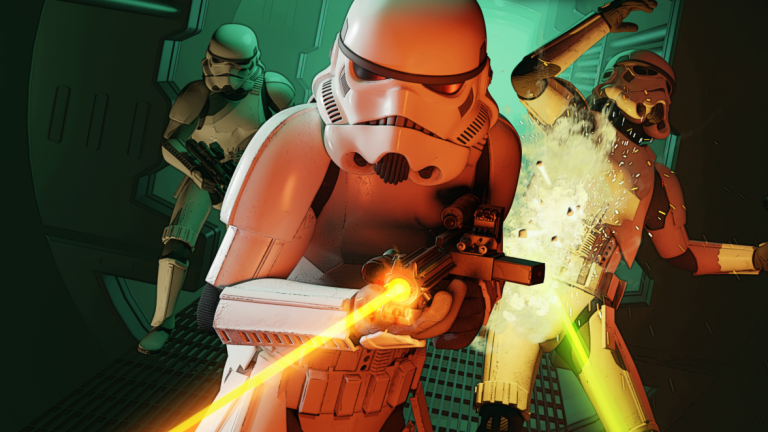Star Wars: Dark Forces and How Nightdive Studios Is Restoring Gaming’s Lost Art
The new Star Wars: Dark Forces remaster is just one of the many ways Nightdive Studios is working to ensure the games industry doesn't forget its past.

In July 2023, the Video Game History Foundation revealed that 87% of classic video games released in the United States are now considered critically endangered. Nearly 9 out of 10 video games ever released in the U.S. are unavailable via modern distribution platforms. How did it come to this?
“It was the Wild West back then,” says Stephen Kick, CEO and co-founder of Nightdive Studios. “[There was] a lack of foresight for saving work… it was lost in a closet or thrown out if a studio was acquired or went bankrupt… it’s just gone.”
Kick co-founded Nightdive Studios in 2012 after trying and failing to download an official copy of one of his favorite games, System Shock 2. Since then, Nightdive has helped rescue many formerly lost games through remasters, re-releases, and remakes.
“It’s always been about treating video games as art,” Kick says. “In order to have that distinction, we have to do a better job of preserving our past so that people can appreciate and experience it.”
Restoring those works of art is a daunting challenge that often requires hunting down rights, design documents, and even original code. Early on, though, one of the greatest obstacles was indifference.
“When we started talking with other publishers, they said, ‘Why would anyone want these old games?’” says Nightdive’s director of business development Larry Kuperman. “They were surprised that a lot of people wanted these games because they didn’t see them as old; they saw them as being classic.”
Nightdive’s current catalog includes blockbuster classics like Turok: Dinosaur Hunter, System Shock, and a brand-new remaster of Star Wars: Dark Forces. Yet, it also features more obscure titles like I Have No Mouth and I Must Scream, Blood, and Noctropolis. It’s a seemingly eclectic collection that spawned from powerful roots.
“[Our] first titles were games that I played with my dad growing up,” Kick says. “It was a personal mission to restore the games I remembered playing with my dad.”
Nightdive’s various successes have allowed the studio to pursue increasingly bigger titles. Yet, the heart of their mission can be found in all their projects regardless of size.
“As we get older and become parents and grandparents, these [games] are our memories,” Kuperman says. “These are sensations that we want to share with our children and grandchildren.”
For as much as we talk about nostalgia when we talk about retro games, Nightdive is just as interested in ensuring that future generations are able to experience these titles.
“As we’ve grown, more of our audience is people who never had the opportunity to play these games the first time,” Kuperman says. “The compliments that do it for me begin with the words, ‘I didn’t know.’ The biblical phrase is ‘A call lifted up their eyes,’ and they go, ‘Oh my goodness, this was here all the time, and I just didn’t know about it.”
Nightdive’s work has also shown how much of gaming’s history can be lost when that history is so often written by the most successful.
“With any art, the goal is to inspire or influence,” Kick says. “When the originators of this industry have their products and experience being locked away, their collective knowledge is basically inaccessible to people who may become developers or designers in the future… a big goal of ours was to ensure that future generations of game developers have that knowledge in their hands that will hopefully inspire them to create something wonderful.”
To that end, Nightdive emphasizes the accuracy of its projects. Though they may optimize games to run on modern hardware or add lost content, such alterations always serve the same greater purpose.
“When we remaster a game, our goal is that the game should play the way you remembered it playing,” Kuperman says. “It’s about recreating that original experience.”
Recreating an original experience can be an arduous process. Many of these games weren’t just lost; they were buried. What motivates the Nightdive team to press on?
“It’s the fans,” Kick says. “They will share their memories of what it was like playing those games with their parents or siblings. Just seeing the trailer again takes them back to that time when they didn’t have the burdens of modern life weighing on their shoulders. They’re kids again with fewer responsibilities or cares.”
Anyone who grew up a gamer has those memories. They are powerful, but they are sometimes not enough. If we want to share and play the games we remember most fondly, the efforts of companies like Nightdive are more vital than ever.
“Do you think that museums are important?” Kuperman asks. “You kind of remember how the pictures look, so why would you want to go see them again? It’s the same thing with playing video games.”
Nightdive Studios’ remasters of Turok 3: Shadow of Oblivion and Star Wars: Dark Forces are out now for all modern platforms.
